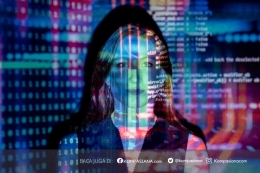3.3
3.3
7. Compile course materials from internet and only cite one source.
34.4
46.7
18.9
Discussion
Based on data analysis result, some respondents did academic cheating behavior by using information technology more than 2 times. It describes that the easiness to get information by using information technology had been misused for self-interest. An increasing of internet use by students has caused copy-paste information behavior without paraphrase or analyzed the content. Scholars believe that an increasing use of internet and computer, has caused ‘copy-paste’ academic cheating increased dramatically in the last years. This research also found and underlined that student’s ethic is low when he/she take other person’s idea or theory. Indeed students or scholars in academic should give high appreciation to the person, who has created idea or theory by cite the person’s name. Students should appreciate another person’s idea or theory, so that there is continuation of academic productivity and creativity.
The examination in the class, some students did illegal ways to get answers of questions. Some of students also saved course material in calculator and cell phone. Then the students used it during examination time. Indeed some students were browsing the internet to get answers of examination questions. This situation needs attention from lecturer or institution by sterilized students from course material, which be used to answer questions during close book examination.
Generally, the research result describes that education students who are also as teacher candidates has not had academic integrity. Moreover, in the future they will be teacher, who teach and educate in the school or education institution. If this condition is still happen, it will cause dishonest behavior in the workplace.
Suggestions
1. To the next research:
- The research should analyze on influencing other variables on academic cheating behavior in education students.
- The research should expand sample through probability sampling technique, so that the result can be generalized.
2. To the education institution:
- The institution should be aware and make policies to decrease academic cheating behavior among education students
- The institution should evaluate learning process that do not asked high grade as a result. So that academic cheating behavior can decrease.
REFERENCES
Anderman, E.M., Murdock, T.B. (editors). 2006. Psychology of Academic Cheating. Burnington, MA: Elsevier Academic Press
Angell, L.R. 2006. The Relationship of Impulsiveness, Personal Efficacy, and Academic Motivation to College Cheating. College Student Journal. Vol.40:1. p.118-131
Becker, D.A., Connoly, J., Lentz,P., Morrison,J. 2006. Using The Business Fraud Triangle to Predict Academic Dishonesty among Business Students. Academy of Educational Leadership Journal, 10, 1, p.37-54.
Buchori, M. 2010. Guru Profesional dan Plagiarisme. Jakarta: Harian Kompas (22 Februari 2010)
Elias, R.Z. 2008. Anti Intellectual Attitudes and Academic Self Efficacy Among Business Students. Journal of Education for Business. 84,2. p.110-116
Mason,K. 2006. Student Integrity. The Business Review. Vol.6:1. p.297-300
Robinson, E. Amburgey, R. Swank, E. Faulker, C. 2004. Test Cheating in Rural College: Studying the importance and situational factors. College Student Journal: 38,3. p.380-395
Whitley, B.E. 1998. Factors Associated With Cheating Among College Students: A Review. Research in Higher Education: 39,3. p.235-274
Wolfolk, A. 2004. Educational Psychology. NJ: Prentice-Hall Inc.
www.forum.unnes.ac.id (access on December, 3rd, 2009)
Follow Instagram @kompasianacom juga Tiktok @kompasiana biar nggak ketinggalan event seru komunitas dan tips dapat cuan dari Kompasiana. Baca juga cerita inspiratif langsung dari smartphone kamu dengan bergabung di WhatsApp Channel Kompasiana di SINI







